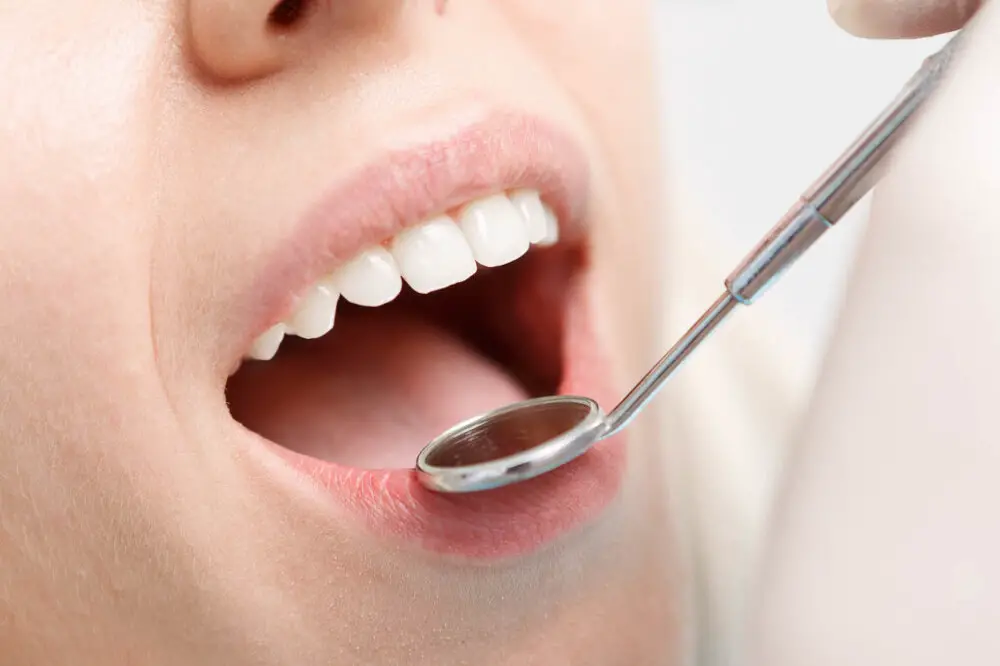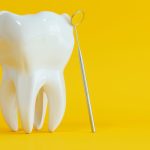Why Do I Have Large Front Teeth? Understanding the Causes and Solutions

If you’ve ever felt self-conscious about your large front teeth, you’re not alone. Many people wonder why their front teeth are larger than the others, or why they seem to stick out more than they should. The truth is, there are several different reasons why someone might have large front teeth, and understanding these causes can help you find the best solution for your unique situation. One of the most common causes of large front teeth is genetics. Some people simply inherit larger teeth from their parents, and there’s not much they can do about it. However, there are also other factors that can contribute to the size and prominence of your front teeth, such as your bite or the shape of your jaw. In some cases, large front teeth can cause functional problems, such as difficulty biting or speaking properly, and may require intervention from a dental professional. Whatever the cause of your large front teeth, it’s important to understand your options for treatment and make an informed decision about how to proceed.
Large front teeth, also known as buck teeth or protruding teeth, can be caused by a variety of factors. Genetics is one of the primary causes, as some individuals inherit large teeth from their parents. Thumb-sucking or pacifier use can also contribute to the development of buck teeth, as can certain conditions such as an overbite or open bite. In addition to aesthetic concerns, large front teeth can also cause functional problems such as difficulty biting and speaking. Fortunately, there are several solutions available to correct large front teeth, including orthodontic treatment, dental veneers, and even surgery in some cases. It is important to consult with a dental professional to determine the best course of action for each individual case.
Understanding why someone has large front teeth is crucial because it can indicate various underlying dental or genetic issues. Large front teeth may be a result of genetics, abnormal jaw growth, or certain medical conditions. In some cases, it can also be due to habits such as thumb-sucking or tongue-thrusting. Identifying the cause of large front teeth is necessary to determine the appropriate treatment or solution. Ignoring the issue may lead to other dental problems like overcrowding or misalignment of teeth, affecting one’s overall oral health and appearance. Therefore, seeking professional advice and understanding the reasons behind large front teeth can help improve one’s smile, confidence, and overall dental well-being.
Causes of Large Front Teeth

Large front teeth, also known as protruding teeth or buck teeth, can be a source of insecurity and self-consciousness for many people. While genetics play a significant role in determining the size and shape of our teeth, there are several other factors that can contribute to the development of large front teeth. One of the most common causes is a discrepancy between the size of the upper and lower jaws, which can cause the top teeth to protrude forward. This can be the result of genetics, but can also be caused by habits such as thumb-sucking or tongue-thrusting during childhood. In some cases, the issue may be due to a misalignment of the teeth or jaw, which can cause the teeth to shift out of place. Another factor that can contribute to the development of large front teeth is a habit of grinding or clenching the teeth. This can put excess pressure on the front teeth, causing them to shift forward or become more prominent over time. Additionally, poor oral hygiene or gum disease can cause the gums to recede, which can make the teeth appear longer and more prominent. In some cases, large front teeth may simply be a result of natural growth and development, but for many people, there are underlying factors that can be addressed with the help of a dental professional. By identifying the root cause of the issue, you can work with your dentist to develop a customized treatment plan that will help you achieve a more balanced, aesthetically pleasing smile.
Genetics and heredity play a significant role in determining the size and shape of our teeth. Our genes, which we inherit from our parents, contain information that determines various traits, including dental features. For example, if a person’s parents have large front teeth, there is a higher likelihood that they will inherit the same trait. Moreover, certain genetic conditions, such as amelogenesis imperfecta, can cause abnormally shaped or sized teeth. Understanding the role of genetics in dental health can help individuals better understand why they may have certain dental characteristics and seek appropriate treatment options.
Abnormal development of the jaw or teeth can be caused by various factors such as heredity, gum disease, injury, or even prolonged pacifier use. When the jaw is not aligned properly, it can lead to an overbite, underbite, or crossbite, which can affect the appearance and function of the teeth. In addition, dental conditions like crowded or crooked teeth can also occur due to the abnormal development of the jaw. Fortunately, there are corrective treatments available, including braces, retainers, and orthognathic surgery, which can help to realign the jaw and teeth, ultimately improving both the function and aesthetics of the mouth.
Acromegaly is a medical condition that is caused by the overproduction of growth hormone in the body. This condition typically occurs in middle-aged adults and is characterized by the enlargement of certain body parts, such as the hands, feet, and face. Acromegaly is often caused by a benign tumor on the pituitary gland, which produces the excess growth hormone. In addition to physical changes in appearance, people with acromegaly may experience health problems related to the excess hormone production, such as high blood pressure, diabetes, and increased risk of heart disease. Treatment for acromegaly typically involves surgery to remove the tumor and medications to regulate growth hormone levels.
As we age, our mouths undergo a series of changes that can affect the size and shape of our teeth. One of the most noticeable changes is the loss of bone mass in the jaw, which can cause the gums to recede and the teeth to appear longer. This can also lead to gaps between the teeth, as well as an increased risk of tooth decay and gum disease. Other changes that occur in the mouth as we age include a decrease in saliva production, which can lead to dry mouth and an increased risk of cavities, and a thinning of the enamel layer that protects the teeth, which can cause them to become more sensitive to hot and cold temperatures. Despite these changes, there are still ways to maintain good oral health and keep our teeth looking their best, such as regular brushing and flossing, avoiding sugary and acidic foods, and visiting the dentist for checkups and cleanings.
Effects of Large Front Teeth

Large front teeth, also known as buck teeth, can have both physical and psychological effects on an individual. Physically, these teeth can cause difficulty with speech, eating, and even oral hygiene. The protrusion of the teeth can make it difficult to close the mouth properly, leading to speech impediments and difficulty chewing. Additionally, the teeth can be more susceptible to damage due to their position and size, making oral hygiene practices such as brushing and flossing more challenging. Psychologically, large front teeth can lead to self-consciousness and low self-esteem. Individuals may feel embarrassed or ashamed of their appearance, leading to social anxiety and avoidance of social situations. This can have a negative impact on mental health and overall quality of life. In extreme cases, the psychological effects can lead to body dysmorphic disorder, where the individual becomes fixated on their appearance to the point where it affects their daily functioning. There are solutions available for those with large front teeth, such as orthodontic treatment or dental veneers. Orthodontic treatment can align the teeth and correct their position, while veneers can improve the appearance of the teeth without the need for extensive orthodontic work. Seeking professional advice from a dentist or orthodontist can help determine the best course of action for each individual case. By addressing the physical and psychological effects of large front teeth, individuals can improve their overall oral health and quality of life.
Aesthetics and self-esteem are closely related when it comes to physical appearance. Large front teeth can be a cosmetic concern for some individuals and can affect their self-esteem. Aesthetics is the study of beauty and how it is perceived, which can influence how we feel about ourselves. If someone feels that their large front teeth make their appearance less attractive, it can affect their confidence and self-esteem. However, it is essential to remember that beauty is subjective, and we should not let our physical appearance define our self-worth. Seeking solutions to address cosmetic concerns can be helpful, but it is equally important to work on building a positive self-image and embracing our unique features.
Dental health problems can range from minor concerns such as tooth decay and bad breath to more serious issues like gum disease and oral cancer. Poor dental hygiene, tobacco use, and a diet high in sugar and acid can all contribute to these issues. In addition, genetics can play a role in the size and shape of our teeth, which can lead to concerns such as large front teeth. To maintain good dental health, it is important to brush and floss regularly, avoid tobacco and sugary/acidic foods, and visit the dentist for regular check-ups and cleanings. In some cases, orthodontic treatment may be necessary to address concerns with the size and shape of teeth.
While the topic of the article is about large front teeth, it’s important to recognize that speech impediments can also play a role in how we communicate. Speech impediments are disruptions in the normal speech pattern, which can be caused by physical or developmental issues. These can include stuttering, lisps, or difficulty pronouncing certain sounds. While speech impediments can be frustrating and embarrassing, there are a variety of treatments available, including speech therapy and practicing specific exercises to improve speech patterns. It’s important to seek help from a professional if you or someone you know is struggling with a speech impediment, as it can have a significant impact on social interactions and self-esteem.
Bite issues and TMJ disorders are often linked with large front teeth as they can cause misalignment in the jaw and affect the way the teeth come together. TMJ disorders occur when there is an issue with the temporomandibular joint, which connects the jaw to the skull. Symptoms include pain, clicking, and popping in the jaw, as well as difficulty or discomfort when opening and closing the mouth. Bite issues can also cause headaches, tooth wear, and even sleep apnea. Treatment for these issues may include orthodontics, dental restorations, or in severe cases, surgery. It’s important to address these issues early on to prevent further damage and improve overall oral health.
Solutions for Large Front Teeth

Large front teeth can be a source of self-consciousness and embarrassment for some individuals. However, there are several solutions available to address this issue. One option is dental bonding, which involves the application of a tooth-colored resin to the front teeth. This material can be shaped and polished to match the surrounding teeth, providing a more uniform appearance. Dental bonding is a relatively quick and affordable solution that can improve the aesthetics of the front teeth. Another option for addressing large front teeth is orthodontic treatment, such as braces or clear aligners. These treatments can help correct misaligned teeth and improve the overall appearance of the smile. In some cases, orthodontic treatment may also be necessary to address underlying issues that are causing the large front teeth. While orthodontic treatment may take longer than dental bonding, it can provide a more long-term solution and improve the function of the teeth as well. Ultimately, the best solution for large front teeth will depend on the individual case and should be discussed with a dental professional.
Orthodontic treatments such as braces or clear aligners are effective solutions for those who have large front teeth. Braces consist of metal or ceramic brackets that are attached to the teeth and wires that apply gentle pressure to shift teeth into their desired position. Clear aligners, on the other hand, are transparent plastic trays that fit snugly over the teeth and gradually guide them into alignment. Both treatments are designed to correct misaligned teeth, improve bite function, and enhance the appearance of the smile. Orthodontic treatments can vary in duration depending on the severity of the case, but the results are long-lasting and can significantly improve self-confidence and oral health.
Dental procedures like bonding or veneers can be a great solution for individuals struggling with large front teeth. Bonding involves the application of a tooth-colored resin material that is shaped and polished to match the surrounding teeth. This procedure can be used to correct small chips, gaps, or cracks in the teeth. On the other hand, veneers are thin shells made of porcelain or composite resin that are custom-made to fit over the front surface of the teeth. This option is ideal for those with more significant cosmetic concerns, such as severe discoloration, misshapen teeth, or gaps between teeth. Both bonding and veneers can provide a natural-looking and long-lasting result, with minimal discomfort and downtime.
Surgical options such as jaw surgery may be considered for individuals with large front teeth caused by a misaligned jaw. This procedure, also known as orthognathic surgery, involves repositioning the jaw to improve its alignment and balance with the rest of the face. By correcting the jaw alignment, the size and prominence of the front teeth can be reduced, resulting in a more aesthetically pleasing smile. Jaw surgery is typically recommended for individuals who have severe jaw misalignment, and may be combined with orthodontic treatment to achieve optimal results. While this procedure may require a longer recovery time than other treatments, it can provide a permanent solution for those who are seeking to improve both the appearance and function of their teeth and jaw.
Other remedies like speech therapy or counseling may be recommended in some cases where large front teeth are causing speech difficulties or self-esteem issues. Speech therapy can help individuals learn how to properly pronounce certain sounds that may be affected by the size of their teeth. Counseling can assist individuals in overcoming any negative feelings or social anxiety they may be experiencing due to the appearance of their teeth. These treatments can be helpful in improving overall communication and confidence levels, and may be recommended in addition to any cosmetic or orthodontic procedures that may be necessary. It’s important to consult with a dental professional to determine the best course of action for each individual case.
Prevention of Large Front Teeth

Large front teeth can be a source of self-consciousness for many individuals. Fortunately, there are several methods for preventing large front teeth. One effective method is through orthodontic treatment. Braces or clear aligners can be used to correct the alignment of the teeth and jaws, which can reduce the prominence of the front teeth. In some cases, orthodontic treatment may also involve the use of headgear or other appliances to redirect the growth of the jaws and teeth. Early intervention with orthodontic treatment can be particularly advantageous, as it can prevent more severe alignment issues from developing over time. Another method for preventing large front teeth is through proper dental hygiene. Regular brushing and flossing can help to prevent the buildup of plaque and tartar, which can lead to gum disease and other oral health issues. Additionally, a healthy diet rich in calcium and other nutrients can promote strong teeth and bones, which can help to prevent malocclusions and other dental problems. Maintaining good oral hygiene habits from a young age can be particularly beneficial for preventing large front teeth, as it can help to ensure that the teeth and jaws develop properly. Overall, by taking proactive steps to prevent large front teeth, individuals can enjoy a healthier, more confident smile.
Good oral hygiene habits are essential to maintain healthy teeth and gums, which can prevent many dental problems, including having large front teeth. Brushing your teeth twice a day with fluoride toothpaste, flossing at least once daily, and using mouthwash can help remove plaque and bacteria that cause tooth decay and gum disease. A healthy diet that is low in sugar and high in calcium can also contribute to strong teeth. Regular dental checkups and cleanings every six months can help detect and prevent dental issues before they become severe. By following these habits, you can maintain good oral health and keep your teeth looking healthy and beautiful, preventing problems such as large front teeth.
Regular dental checkups are an essential aspect of maintaining optimal oral health. These appointments allow dental professionals to monitor the health of your teeth and gums and identify any potential issues before they become serious problems. During a checkup, your dentist will clean your teeth, removing any plaque or tartar buildup, and examine your mouth for signs of decay, gum disease, or other concerns. They may also take x-rays to get a better look at the structures below the surface. By attending regular dental checkups, you can help prevent the development of serious dental issues, such as large front teeth, and keep your smile healthy and beautiful for years to come.
Although it may seem unrelated, proper nutrition and diet can actually play a significant role in the development of large front teeth. Consuming a diet that is high in sugar and carbohydrates can lead to tooth decay and the need for dental work such as fillings, crowns, and even extractions. Additionally, a lack of essential vitamins and minerals can weaken tooth enamel, making it more susceptible to damage and decay. On the other hand, a balanced diet that is rich in fruits, vegetables, lean proteins, and whole grains can help maintain optimal oral health and prevent dental problems that can contribute to the appearance of large front teeth.
Avoiding harmful habits like teeth grinding or nail biting is crucial in maintaining healthy teeth and preventing damage to your front teeth. Teeth grinding, also known as bruxism, can wear down the enamel of your teeth, causing them to become shorter and more prone to chipping. Similarly, nail biting can cause your front teeth to shift and become misaligned, leading to a less attractive smile. It’s essential to be mindful of these habits and take steps to break them, such as stress reduction techniques or wearing a mouthguard at night to protect your teeth while you sleep. By avoiding these harmful habits, you can maintain healthy, beautiful front teeth for years to come.
The article \Why Do I Have Large Front Teeth? Understanding the Causes and Solutions\ explains the reasons behind having larger-than-normal front teeth, which may cause cosmetic and functional concerns. The primary causes of this condition include genetic inheritance, jaw development issues, and tooth wear. Additionally, certain habits, such as thumb-sucking and mouth breathing, can also impact the size and shape of the front teeth. The article suggests that orthodontic treatment, such as braces or Invisalign, may be beneficial in correcting this issue. In severe cases, surgical procedures, such as tooth reduction or jaw surgery, may be required. Overall, understanding the causes and solutions of large front teeth can help individuals make informed decisions about their dental health and improve their overall appearance and quality of life.
Seeking professional help for large front teeth is crucial to address any underlying dental or medical conditions that may be causing the problem. A dentist or orthodontist can perform a thorough examination to determine the cause and recommend appropriate treatment options. Left untreated, large front teeth can lead to dental problems such as crowding, overlapping, and misalignment, which can cause discomfort and affect the appearance of the smile. Additionally, large front teeth may be a symptom of underlying medical conditions such as gigantism or acromegaly, which require specialized medical attention. Seeking professional help for large front teeth can lead to improved dental health, increased self-confidence, and a more aesthetically pleasing smile.
Preventative measures for dental health are crucial to avoid common dental problems such as tooth decay, gum disease, and bad breath. Maintaining proper oral hygiene by brushing twice a day, flossing daily, and using mouthwash can help prevent the buildup of plaque and bacteria. A balanced diet with limited sugary and acidic foods and regular visits to the dentist can also aid in maintaining good dental health. Neglecting dental hygiene can lead to more serious dental problems such as misaligned teeth, overbite, underbite, and large front teeth. Thus, encouraging individuals to take proactive steps towards their dental health can lead to a healthier and brighter smile.
Conclusion

In conclusion, having large front teeth can be attributed to a variety of reasons such as genetics, tooth grinding, and malocclusion. It can also lead to self-consciousness and affect one’s confidence. Fortunately, there are several solutions available to address this issue, including orthodontic treatment, dental bonding, and porcelain veneers. It is important to consult with a dental professional to determine the best course of action for each individual case. By understanding the causes and available solutions for large front teeth, individuals can take control of their oral health and achieve a beautiful, confident smile.







